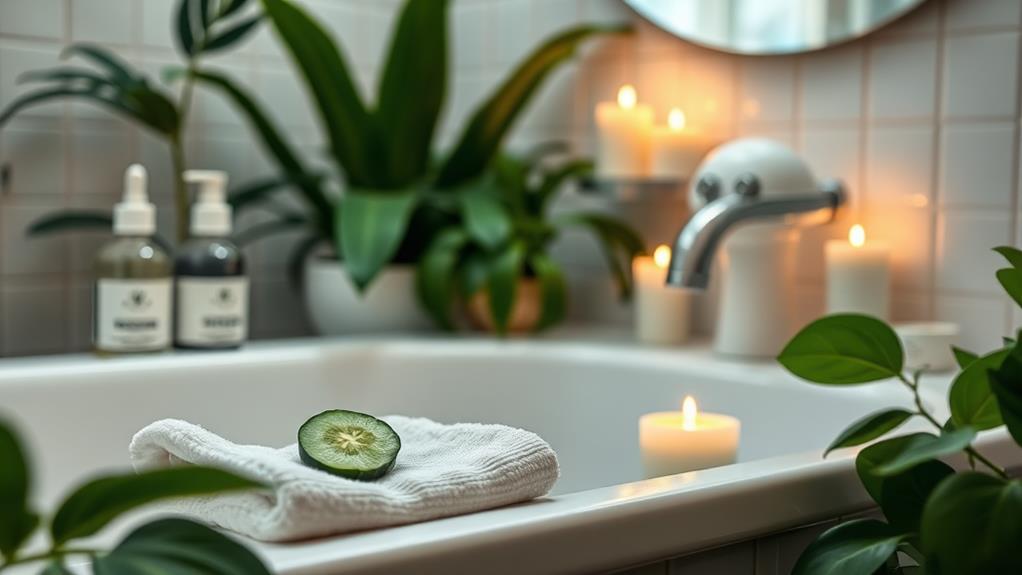If you've ever struggled with skin issues, you know how frustrating it can be to find a solution. It's not just about products; establishing a consistent routine is essential. You might be surprised by how simple changes can lead to clearer skin. From choosing the right cleanser to managing your diet, every small adjustment counts. And while many tips might sound familiar, some might just change your approach entirely. Curious about the specific steps you can take? Let's explore these effective strategies for achieving the skin you desire.
Establish a Consistent Routine
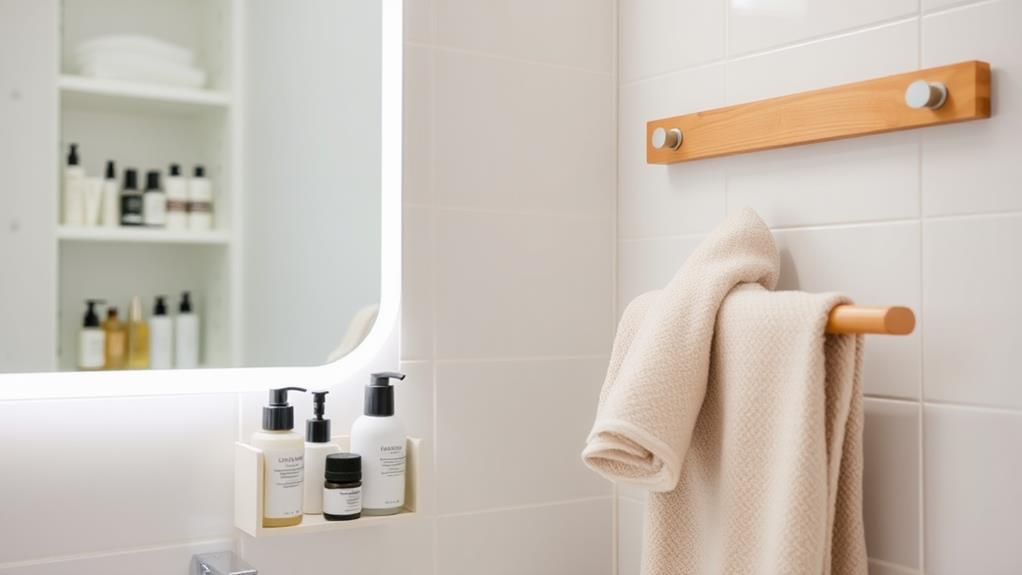
To achieve clear skin, you should establish a consistent skincare routine that you follow diligently. Start by washing your face twice daily with a mild, non-comedogenic cleanser. This helps remove dirt and oil without clogging your pores, which is vital for preventing acne.
After cleansing, don't forget to apply a good moisturizer. Keeping your skin hydrated is essential, and a non-comedogenic moisturizer will help maintain that moisture balance.
Incorporate targeted treatments like benzoyl peroxide or retinol into your skincare routines. These treatments can effectively tackle specific types of acne and promote skin rejuvenation.
Also, remember the importance of sunscreen! Using SPF 30 or higher every day protects your skin from UV damage and prevents complications like pigmentation and premature aging.
Exfoliating gently 1 to 3 times a week can also make a significant difference. It enhances cell turnover and helps prevent clogged pores, contributing to smoother, clearer skin.
Choose the Right Cleanser
Choosing the right cleanser is essential for maintaining clear and healthy skin. When selecting a cleanser, consider your skin type.
If you have oily skin, look for oil-free and non-comedogenic options that help reduce excess oil and prevent clogged pores. This will keep your skin feeling fresh without adding more shine.
On the other hand, if your skin is dry, you should opt for hydrating, gentle cleansers that preserve moisture. Strong soaps can strip away natural oils, making dryness even worse.
For all skin types, a mild, foaming cleanser with fruit acids like glycolic or lactic acid can effectively remove impurities without drying out your skin.
It's also important to wash your face twice daily, as studies suggest this greatly improves acne lesions.
Don't forget to cleanse your face after sweating or exercising, too! This helps prevent the buildup of sweat and bacteria, which can lead to breakouts.
Moisturize Daily
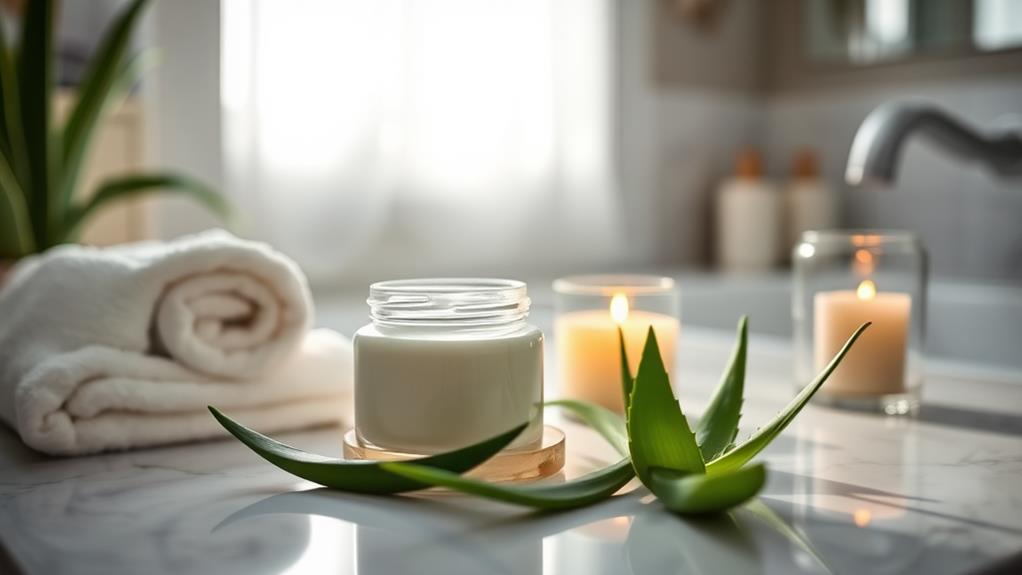
Your skin's hydration is essential for achieving that coveted clear complexion, and moisturizing daily plays an important role in this process. When you apply a moisturizer after cleansing, you help lock in moisture, enhancing your skin's barrier function. This protects your skin from environmental damage, keeping it healthy and radiant.
If you have oily or combination skin, opt for lightweight, oil-free moisturizers. These options hydrate your skin without adding extra oil, which can lead to breakouts. Non-comedogenic moisturizers are also vital, as they won't clog your pores, making them perfect for acne-prone skin.
For those with dry skin, richer, cream-based formulations can provide the extra hydration needed.
Whichever type you choose, consistency is key. By moisturizing daily, you can improve your skin's overall texture and elasticity over time, promoting a healthier appearance.
Use Sunscreen Effectively
Protection from the sun is essential for maintaining clear, healthy skin. One of the best ways to do this is to use sunscreen. Choose a broad-spectrum sunscreen with an SPF of at least 30. This protects you from both UVA and UVB rays, which can damage your skin and increase the risk of skin cancer.
When you apply sunscreen, don't be shy—use about one ounce, which is roughly a shot glass full, to cover all exposed skin. Don't forget those tricky spots like the back of your neck and ears!
Reapply sunscreen every two hours, especially after swimming or sweating, to keep that protection going strong. If you plan to be outside, try to seek shade between 10 a.m. and 4 p.m. when the sun's rays are the strongest.
While some makeup and skincare products may contain SPF, remember that they shouldn't replace regular sunscreen application.
Exfoliate Regularly
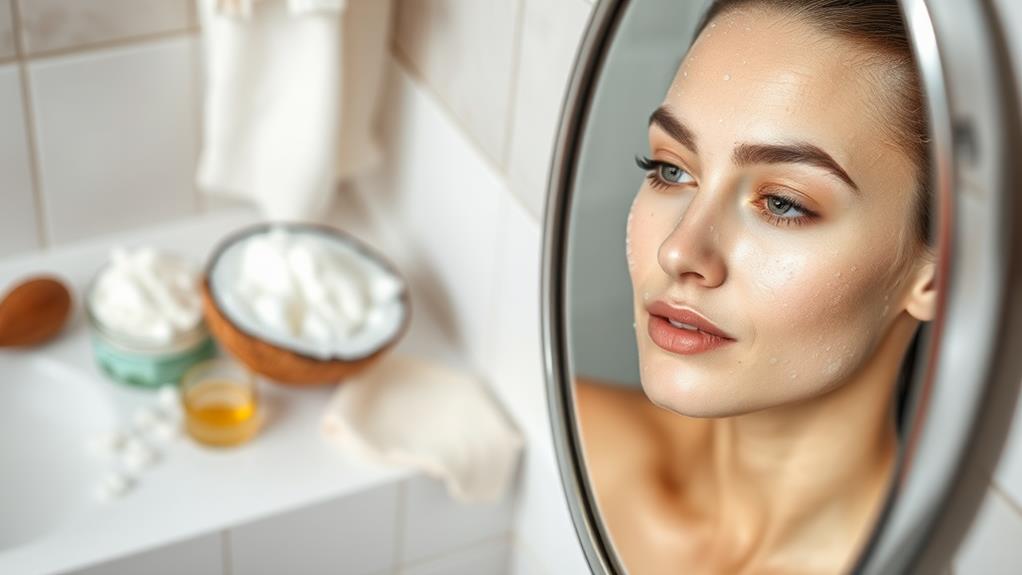
Maintaining clear skin goes beyond just sun protection; regular exfoliation plays a key role too. Exfoliating helps remove dead skin cells that can clog your pores and lead to acne. Aim to exfoliate about 1-3 times a week, depending on your skin type. If you have sensitive skin, you might want to start with once a week and adjust as needed.
Chemical exfoliants, like AHAs and BHAs, are often gentler and more effective than physical scrubs. These ingredients promote skin cell turnover without causing irritation, making your skin feel smoother and more radiant. Plus, products with salicylic acid can help clear existing breakouts while preventing new ones by keeping your pores free from debris.
However, be cautious not to over-exfoliate! Doing so can damage your skin barrier, leading to increased sensitivity and possibly more breakouts. Always monitor how your skin reacts and adjust your exfoliation frequency accordingly.
Manage Stress Levels
Stress management is essential for achieving clear skin, as chronic stress can lead to hormonal changes that trigger acne outbreaks. When you're stressed, your body releases cortisol, which can worsen skin conditions.
To combat this, try to incorporate regular exercise into your routine. Just 30 minutes of moderate exercise each day can help lower stress levels and boost endorphins, promoting better mood and skin health.
Additionally, practicing relaxation techniques such as yoga or meditation can greatly reduce stress and the stress-related skin issues that come with it. Aim for 7-9 hours of quality sleep each night, since lack of sleep can increase stress and exacerbate acne.
Don't forget to enjoy yourself! Incorporating activities you love into your daily routine can help manage stress and improve your overall mental well-being.
Whether it's reading, drawing, or spending time with friends, these moments can positively influence your skin clarity. By focusing on stress and acne, along with regular exercise for skin health, you're on the right track to achieving that clear skin you desire.
Maintain a Balanced Diet

Eating a balanced diet is essential for achieving clear skin, as the right nutrients can make a significant difference in your complexion. Focusing on a variety of fruits, vegetables, whole grains, and lean proteins will provide your body with vitamins and antioxidants that fight oxidative stress. These nutrients help keep your skin healthy and vibrant.
Incorporating omega-3 fatty acids from sources like fish, flaxseed, and walnuts can also be beneficial. They help reduce inflammation, which may improve your skin's overall appearance.
It's important to avoid high glycemic index foods, like sugary snacks and white bread, since they can worsen acne. A study showed that many participants saw a reduction in acne when they switched to a low-glycemic diet.
Additionally, keep an eye on your dairy intake. Skim milk, in particular, has been linked to an increased risk of acne due to insulin-spiking hormones in milk products.
Stay Hydrated
After focusing on a balanced diet, it's important to reflect on how hydration plays an essential role in your skin's health. Staying hydrated is vital for maintaining skin moisture, which prevents dryness and other skin issues. Aim to drink at least eight glasses of water a day to keep your skin looking its best. Proper hydration not only supports your skin's elasticity and plumpness but also helps you achieve a healthier, more radiant appearance.
When your skin is dehydrated, it can lead to a dull complexion and uneven texture. However, with adequate water intake, you promote a clearer and more vibrant look.
In addition to drinking water, don't forget about hydrating foods! Fruits and vegetables, like cucumbers, oranges, and watermelon, are packed with water and can boost your overall hydration.
Moreover, studies suggest that when you stay hydrated, topical skincare products work more effectively. This means your lotions and creams can penetrate deeper, giving you even better results.
Avoid Popping Pimples
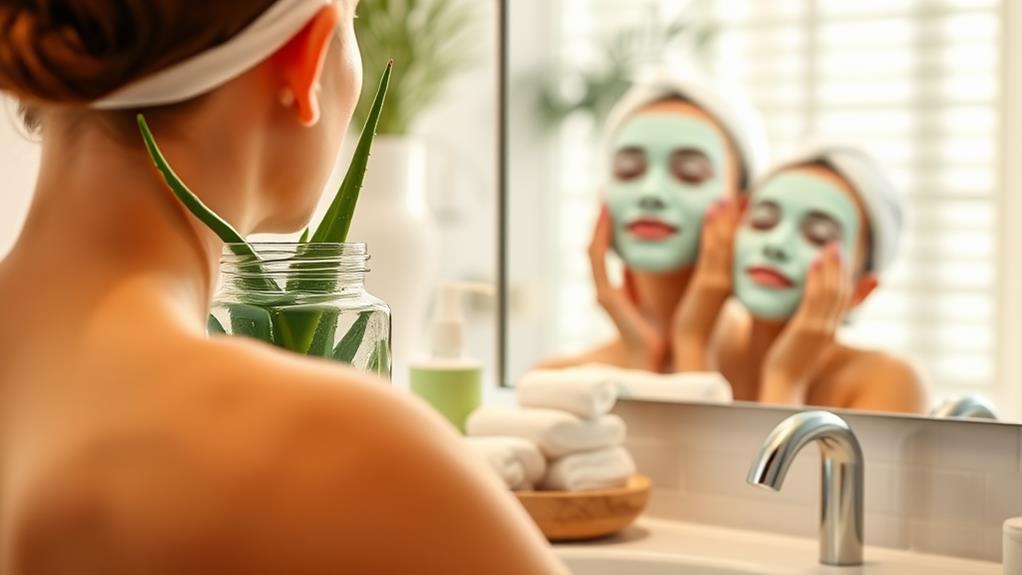
Resisting the urge to pop pimples is essential for maintaining clear skin. While it might seem tempting to squeeze out that pesky pimple, you could actually be making things worse. Popping pimples can increase inflammation, which prolongs the healing process and leads to more noticeable acne breakouts.
When you pop a pimple, you risk pushing bacteria deeper into your skin, potentially causing even more severe acne or painful cysts.
Additionally, squeezing pimples can lead to scarring, which might be permanent, affecting the natural texture and pigmentation of your skin. A study showed that those who frequently pop pimples are more likely to experience post-inflammatory hyperpigmentation, especially on darker skin tones.
Instead of popping, focus on keeping the area clean and applying topical treatments. Letting the pimple heal naturally is the best way to minimize complications and help your skin clear.
Select Non-Comedogenic Makeup
Choosing the right makeup can greatly impact your skin's health, especially if you're prone to breakouts. When selecting makeup, look for non-comedogenic makeup, as it's specifically formulated to avoid clogging your pores. This makes it a safer choice for acne-prone skin, helping you maintain a clearer complexion.
Ingredients like water, glycerin, and certain silicones are great to have in your products, as they keep your skin moisturized without causing breakouts.
Many brands label their products as "non-comedogenic," making it easier for you to find suitable options for your skincare needs. By using non-comedogenic makeup, you can considerably reduce the risk of acne cosmetica, which is acne caused by cosmetic products.
Get Plenty of Sleep

Prioritizing sleep can be a game-changer for your skin. If you want to achieve better skin health and minimize breakouts, aim for 7-9 hours of quality sleep each night. Studies show that 65% of participants with inadequate sleep reported having acne. That's a significant number, and it highlights just how essential sleep is for your skin.
When you don't get enough sleep, your body produces higher levels of stress hormones like cortisol. This increase can lead to inflammation, which may worsen existing acne. During sleep, your body works hard to repair itself, including regenerating skin cells. This process is critical for maintaining clear skin, so skipping out on sleep could hinder your skin's ability to heal.
Additionally, lack of sleep can weaken your skin's barrier function, making it more sensitive and prone to irritation.
So, if you've been struggling with breakouts, consider reviewing your sleep habits. By prioritizing restful nights, you'll not only feel better but also give your skin the chance it needs to look its best.
Embrace the power of sleep—it's one of the simplest ways to enhance your skin health!
Limit Sugar Intake
While getting enough sleep plays an essential role in skin health, what you eat also greatly impacts your complexion. One significant factor is your sugar consumption. High sugar intake can spike your insulin levels, leading to increased oil production and, unfortunately, more acne.
In fact, a 2009 study showed that people on a low-glycemic diet—meaning they avoided foods with high glycemic indexes, like white bread and sugary snacks—saw a big reduction in acne severity. About 87% of participants reported improvements!
So, if you want to achieve clear skin, consider cutting back on those sugary treats. By reducing sugar consumption, you can help keep your insulin levels stable, which may result in fewer breakouts and overall better skin health.
Instead of reaching for that candy bar, try snacking on whole foods like fruits, vegetables, and whole grains. Not only will these alternatives help promote clearer skin, but they'll also provide your body with better nutrition.
Consult a Dermatologist

Your skin's health deserves expert attention, especially if you're struggling with persistent acne. It's time to consult a dermatologist. They can create tailored treatment plans that address your specific concerns, something over-the-counter products often miss.
A dermatologist can identify skin conditions like hormonal or cystic acne, which might need specialized treatments beyond standard skin care tips.
Regular visits to a dermatologist aren't just about treating current issues; they're also essential for early detection of potential problems. For instance, catching skin cancer early can increase the five-year survival rate to an impressive 98% for melanoma.
During your appointment, a professional skin assessment will help you understand your unique skin type. This knowledge allows them to recommend personalized skincare regimens that fit your needs perfectly.
Plus, they often provide access to advanced treatments, such as laser therapy or chemical peels, which can enhance your skin's clarity and texture far beyond what home care can achieve.
